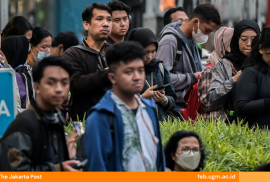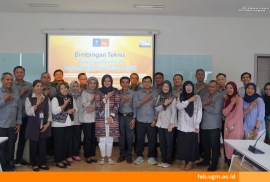The Faculty of Economics and Business Universitas Gadjah Mada (FEB UGM) has once again achieved outstanding results in global rankings. This time, FEB UGM managed to reach the top position in the Quacquarelli Symonds World University Rankings (QS WUR). In 2024, the UGM Social Sciences and Management cluster was ranked 178th worldwide and second in Indonesia in the QS WUR by Faculty Area. This represents an improvement on the 2023 ranking, when FEB UGM was placed 180th globally.
In the QS World Rankings by Subject, three of FEB UGM’s study programs are also in the top positions. The Economics and Econometrics program achieved a notable improvement, advancing 100 ranks from the previous year’s 301-350 to rank 201-250 globally and third in Indonesia.
Subsequently, Accounting and Finance demonstrated its resilience by maintaining its position at 151-200 globally and third in Indonesia. Furthermore, the Business and Management Studies program also demonstrated its resilience by maintaining its position at 201-205 globally and second in Indonesia.
In a statement, the Dean of FEB UGM, Prof. Dr. Didi Achjari, M.Com., Ak., C.A., expressed his gratitude for the achievements of FEB UGM. He noted that this achievement is satisfying and reflects the quality of education and reputation of FEB UGM.
“This achievement represents a form of global recognition of the quality of education at FEB UGM. Furthermore, this achievement is the result of the collective efforts of the entire academic community of FEB UGM, which have been directed towards maintaining the sustainable quality of education,” he stated on Monday, April 20th.
The QS World University Rankings are based on five key indicators: academic reputation, graduate reputation, citations per scientific journal, productivity index, and impact of publication results, as well as international publication collaboration. FEB UGM’s success in maintaining quality standards in these five indicators has contributed to this achievement.
“This achievement can be attributed to the provision of quality education at FEB UGM, in accordance with the standards set by QS.” he expressed.
Didi emphasized that FEB UGM has a solid commitment to continue improving the quality of education and research and to continuously collaborate with various partners in the development of knowledge, especially in the fields of accounting, management and economics. The success achieved by FEB UGM in the 2024 QS WUR ranking must be linked to the improvement of the quality of teaching and learning on campus.
FEB UGM supports and facilitates the development of human resources, which significantly strengthens the quality of graduates produced and enables them to compete globally. To date, FEB UGM has 142 faculty members, 28 of whom are professors.
Another effort to improve academic performance is to adapt the curriculum to ensure the relevance of contributions to society and the needs of business and industry. This is done by taking advantage of the space for change resulting from the disruption caused by developments in technology and information systems, for example, by adding aspects of technology and information systems to the educational curriculum. Then include aspects of Artificial Intelligence (AI) in several courses.
To support the quality of learning, Didi continued, FEB UGM has also prepared hybrid learning support facilities. This has been realized through the establishment of Learning and Academic Production (LAMP), which has produced various innovative learning content models to support today’s learning process.
FEB UGM continues to improve the quality of research and publications of its academic community. Some of the efforts include research grants, support for holding international seminars, research collaborations and international publications. FEB UGM provides additional research grant schemes, including partner collaborative research grants, to encourage more research and publications. As a further step, the publication intensification program was updated to align with the new mission and vision by adopting the Australian Business Deans Council (ABDC) Journal Quality List and the Chartered Association of Business Schools (CABS) Academic Journal Guide as the leading rankings. In addition, the number of journals selected by FEB UGM should be increased to accommodate multidisciplinary research by FEB UGM faculty.
FEB UGM also has three publication units to accommodate the scientific research results of its academic community. First, the Indonesian Economic and Business Journal (JIEB), published by the FEB UGM Publication Unit, managed to increase its ranking in Scopus with a Q3 ranking in the fields of economics, management and accounting. Second, Gadjah Mada International Journal of Business (GAMAIJB), published by MM FEB UGM. Third, the Journal of Leadership in Organization (JLO) has a Sinta Index of 2.
“FEB UGM always encourages lecturers and students to make their best intellectual contributions with high quality academic works that are useful for building thought leadership in their fields,” he explained.
Didi said that FEB UGM is a business school accredited by the Association to Advance Collegiate Schools of Business (AACSB). The AACSB accreditation encourages FEB UGM to organize various activities and programs according to the AACSB standards, the vision and mission to become a leading business school and to develop future business leaders with sustainability aspects. Meanwhile, at the national level, FEB UGM has applied for accreditation for nine programs, five of which have received LAMEMBA Superior accreditation.
As an AACSB-accredited business school, FEB UGM has a network of partner universities abroad. This network provides opportunities for FEB UGM students to participate in student exchange programs and dual degree programs at partner universities abroad. FEB UGM has hosted students from different parts of the world. “FEB UGM builds networks with alumni and partner institutions, both from central and regional governments, state-owned enterprises, private companies and international institutions, to provide broader opportunities for students to learn and for faculty to develop, disseminate and apply the results of their research,” he explained.
Didi added that as a leading business school, FEB UGM has been consistently actively involved in various good business school association memberships and collaborated with various partners at both national and international levels. FEB UGM has worked with more than 76 partners in Asia, America, Australia and Europe, organizing exchange programs, double degree programs and summer courses. These include the University of Antwerp, Erasmus University, Queen Mary University of London, Tulane University, Hiroshima University, and the University of Melbourne. FEB UGM is also one of the initiators of the Partnership of Asian Management Schools (PAMS) by collaborating with four partner universities, namely Woosong University, Foreign Trade University, Sun Yat-sen University and Universiti Kebangsaan Malaysia since 2020.
Meanwhile, FEB UGM is developing education and learning in an integrated process that includes learning inside and outside the classroom to produce graduates as future-ready leaders. It also develops soft skills development activities, career preparation, and student wellness facilities. Learning innovations are also carried out to improve the skills needed for future work in the form of self-leadership, digital fluency, critical and design thinking, resilience and entrepreneurship for business organizations, government and society at local, national and international levels.
“We are developing teaching innovations such as case-based learning, project-based learning, and experiential learning so that the resulting graduates will have competencies that are aligned with the needs of the job market,” he said.
Reportage: Kurnia Ekaptiningrum






